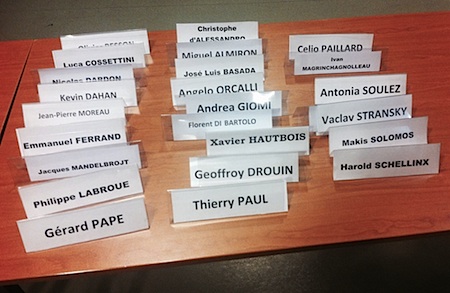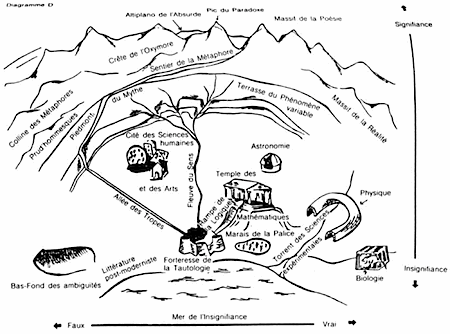On this page you will find an evolving collection of notes, thoughts and links around the presentation on (en gros) emergence in (free) electroacoustic improvisation by Rébus & myself, at the international interdisciplinary colloquium "L'émergence en musique", May 9-11 in Plaisir/Versailles (France).
Emergence at/in the frontiers, fringes & trenches of contemporary music
≥ may 11, 2016.
Memory never is the thing remembered
( * )

Abstract
Among the many trends and different directions of contemporary music that developed in the second half of the twentieth century, free improvisation, sound art, drone ‘minimal’ music and non-academic electro-acoustic investigations have long time been neglected by established – artistic and academic – institutions. Together they constitute what we may call the frontiers, outskirts and fringes – even the trenches – of contemporary music, though they are in fact 'genres' that are very much alive and booming in terms of creativity, inventiveness, popularity and sheer number of professional practitioners, who often operate in the as yet only very partially mapped grounds that connect the visual and the sonic arts.
We intend to demonstrate that notions of emergence are central to many of these practices, both on a micro- and on a macro-level. We will try to identify and define workable notions of emergence as common and unifying denominators within these distinct approaches, and thus uncover, at least partially, the deeper level that connects and reconciles contemporary music genres that at first encounter often will seem to be antipodes.
Music lies - emerges - in the ear-brain of the beholder
(Free) Electroacoustic Improvisation [EAI]
[IAE] Improvisation Electro-Acoustique (libre)
(cf. [SF])
«...smells like Fluxus and Dada spirit...»
Around the time of Erik Satie's 150th birthday, we're engaging in a pretty ancient tradition in musical experimentation/speculation, that has grown into a true folklore, with its own specific idiom and code, 'migrants' from a wide range of other art disciplines, and a good dose of bricolage, DIY, art brut...
Porous frontiers, in both directions...
- Pratique musicale vivante, connectée sur un échelle globale, largement 'extra-institutionelle'
- Basé librement et parfois 'naivement' sur les techniques et idées des musiques avant-gardistes/expérimentales post-WWII (c'est dans ce sens qu'on parle d'une 'musique folk-avantgardiste'
- Bricolage et 'détournement sans gène'
- Esprit dada/fluxus
- Mélange analogique/numérique
- Pratiquants souvent musico-autodidactes et/ou avec formation/pratique en arts visuelles
Towards workable notions of emergence
A whole that is bigger than the sum of its parts (cf. Aristotle, Shakespeare...). A (qualitatively defined) macrostructure that represents some order in an otherwise locally disordered system or a complex system. An emerging pattern often occurs as a phase transition, between complete randomness and a total, cold order. As such, the emerging pattern often will be fragile (sensitive to the external parameters).
Do not confuse emergence with convergence!
Weak emergence is emergence that is reducible to computation (in music: resulting, for example, from the execution of a score).

[ René Thom - Ontological anteriority of the continuum over the discrete: the discrete emerges from the continuum. More generaly, according to Thom, mathematics is (like biological life) a succesion of emergences of structures. Importance of the qualitative. Importance of mistakes and imprecisions. Importance of the notion of bifurcation. ]
Physical emergence
Strong emergence
...
"Emergence is at the heart of a relational universe: stones are hard and liquids flows, but the molecules and atoms that stones and liquids are made of are not solid, neither are they wet."
Quotes:
[TH 131] "Music is sound that has listened to itself."
[TH 134] "[T]he actual experience of music is both fundamental, and resolutely distinct, even divergent from the retrospective critical analysis of it."
[TH 137] "The music always does something to you, generates a particular center of subjectivity in you, around which your experience of music turns."
[SB #341] "Visual perspective induced our notion of space, in which things can appear
in a many different places, but still be perceived as 'the same'. Auditory perspective induced our notion of time,
in which things can occur at a many different instances, but still be perceived as 'the same'.
Thus,
in days long gone, music gradually woke us from being trapped in an eternal. Now.
Now. You try to imagine what a such coming into being will have felt like...
Music sticks around to remind us."
Related (sometimes less, sometimes more):
~ Karlheinz's Song of Praise - 1982 interview with Karlheinz Stockhausen at the Royal Conservatory of The Hague, the Netherlands.
~ Y've got the music in ya. About rhythm and auditory perspective, and how we landed within time.
~ Hear It! (Sound - Art - Music). Opening lecture for a sound-art and music event at the Stedelijk Museum in Amsterdam, the Netherlands, April 2011.
~ Le Temps Musical - Evolving, pseudo-random/contingent list and inventory of quotes thoughts, links and notes related to music and time.
Bibliography:
[MT] Max Tegmark - Consciousness as a state of matter. 2015
[P] Nam June Paik - An essay for the new ontology of music. In: Postmusic. The Monthly Review of the University for Avant-garde Hinduism.
[SF] H. Schellinx, E. Ferrand - Az elektroakusztikus improvizáció mint metanyelv és rögzített pont (Electroacoustic improvisation as metalanguage and fixed point (i)). In: Médium Hang Esztétika - Zeneiség a mediális technológiák korában, edited by Barnabás Batta. University of Szeged, 2009
[TH] Tim Hodgkinson - Music and the myth of wholeness. Toward a new aesthetic paradigm. MIT Press, 2016
notes __ ::
(*) cf. A. E. van Vogt, The World of A.
[
^ ]
(**) "I saw you / I see you / I see you / I saw you / . . . / I see you / I see you / I see you / I see you" __ (post scriptum: Un hélicoptère du secours en montagne était sur place rapidement. Si oui ou non les sauveteurs arrivaient à l'heure, ça reste une question ouverte.)
[
^ ]
tags: emergence
# .468.
comments for Emergence ::
|
Comments are disabled |